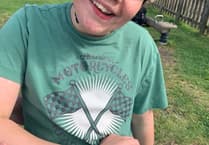Ernie Briscoe may not be one of Woking FC’s most famous footballers, but his story is worth telling.
His son-in-law Brian Ellis contacted the News & Mail to see if we had any details of his playing career with Woking FC, which was not long – from just February to May 1939.
Unfortunately, it was cut short by the Second World War, as most competitive football matches were suspended for the duration of the war.
Researcher Mark Coxhead has kindly delved into the back copies of the News & Mail on microfilm at the Surrey History Centre looking for Woking FC match reports in which Ernie is mentioned.
Mark said: “A typical article would go from the top of the broad sheet page of the sports section to the bottom, but sometimes much longer.
“The correspondent ‘Cardinal’ must have put a lot of work in writing up the matches. References to Ernie Briscoe are very frequent.”
A match report from the edition of March 31, 1939, has the headline ‘BRISCOE THE BEST FORWARD’.
Mark added: “The quality of the microfilm for this page is not that clear and is just a partial article. Ernie appears to have scored a goal as his name is in capitals. Part of the report reads: ‘Practically all the work in Woking’s attack came from the two wingers, Briscoe and Reeves. The former, who has now got back to form, was the best forward in the field, and Woking may have done better if he received more support’.”
In a report of a match in the News & Mail of May 3, 1939, in which Woking were beaten by Metropolitan Police by three goes to nil in the final of the Surrey Charity Shield, Ernie only gets a brief mention, with the correspondent ‘Cardinal’ writing: “Searle and Briscoe worked well to get the attack going.”
Woking FC and Ernie were mentioned in the Sunday Dispatch in its edition of February 12, 1939, in a game played against Dulwich Hamlet. The reporter observing: “Briscoe came into the side at outside-right yesterday in place of the injured Shepherd. He can hit a ball truly with both feet, and I give a free tip to Woking – play him at centre forward.”
Brian Ellis and his wife live on the Wirral in Merseyside and this is where Ernie came from.
Ernie was born in 1918. His mother and father died at an early age and he was brought up by his older sister and three brothers in Birkenhead.
He left school at 14 and moved to London to work in the office of a large butchers at Smithfield Meat Market.
He had played for Cheshire Schoolboys and after moving south he worked his way through the different Surrey County levels before joining Woking FC in February 1939.
Ernie served in the army during the Second World War, rising to the rank of sergeant, and it was an injury he received that put an end to his post-war football career.
He served with the King’s Liverpool Regiment and Brian says that in preparation to the D-Day landings Ernie did his training in Prestwick, Scotland.
Thousands of service personnel were sent to remote locations there. In a story about this in the Scotsman newspaper in 2015, it was recalled that secluded Highland estates offered perfect cover for the activities of the soldiers, airmen and navy personnel, with castles requisitioned from their owners and vast camps springing up in their grounds.
It’s said that practically every single soldier who took part in the D-Day campaign was to pass through No 1 Combined Training Centre, which was set up in the midst of Inverary Castle.
On D-Day itself (June 6, 1944) Ernie was part of the strike force on Juno Beach. Brian says the horrors of war on that beach are highlighted in an article on the website http://seftonrugby.org.uk/Morri-sonEM_MC.html that is about commander, Major Edward Maxwell Morrison.
The article includes: “On the Western end of the beach A Company of the Liverpool Irish landed with the leading company of the Royal Winnipegs. Major Morrison, the A Company (Commander) was the first out of the landing craft: heavily laden, he jumped unwittingly into nine feet of water but managed to stagger ashore. Others disembarking from the same landing craft, including the second in command of the Royal Winnipegs company were killed struggling to the shore. With a mere handful of his troops Major Morrison reached the limited protection of the sand-dunes and established a command post.”
Brian says Ernie’s regiment received such bad casualties on D-Day that it wasn’t reformed after the war. However, those who could, pushed on, Ernie included. However, he lost his eye while moving through France and it thus ended both his army and what could have been a promising football career.
After the war Ernie returned to Merseyside and continued in the wholesale meat industry at Birkenhead and Stanley Meat Market Liverpool. He played veterans golf at Bidston Birkenhead and Abergele, where won many competitions.
He enjoyed family life and passed away in 1998. Had he lived longer, he would have received the French Legion of Honour.
His daughter Sue, son-in-law Brian and grandson Chris miss him greatly.





Comments
This article has no comments yet. Be the first to leave a comment.